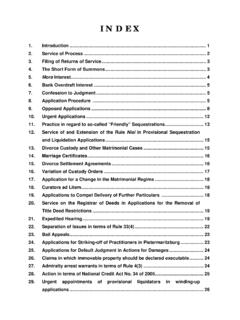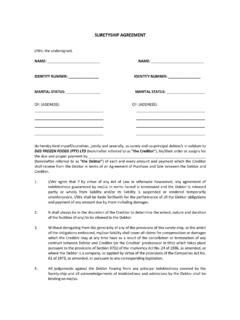Transcription of Summary of Amendments to the Michigan Court Rules on …
1 1 Summary of Amendments to the Michigan Court Rules on Civil DiscoveryThis form outlines some of the major changes to the Michigan Court Rules (MCRs) on discovery going into effect January 1, 2020. This chart is meant to be a quick guide to the major Amendments , but it does not cover every change to the Rules . It includes the following: New Rules requiring initial disclosures, with special provisions for no-fault and personal injury cases New provisions on the scope of discovery, which now includes proportionality considerations Limits on interrogatories (20 in most cases, and 35 in domestic relations matters) New one day of 7 hours limit on depositions Provisions on discovery plans, conferences, and mediation of discovery disputes New provisions on electronically stored information (ESI), including ESI discovery conferences and plans New MCR regarding filing of confidential materials in domestic relations cases New discovery provisions for juvenile proceedings New probate Court discovery provisionsThis chart shortens and paraphrases much of the new rule language, so be sure to review the order to see the exact language and numbering of the Amendments , as well as additional Amendments not covered in this Civil Procedure; Availability and Timing of (A)Availability and Timing of Discovery(1) When initial disclosures are required, party may seek discovery only after serving them under MCR (A).
2 Otherwise party may seek discovery when authorized by MCRs, stipulation, or Court order.(2) No discovery is permitted in district Court except by leave of Court or on stipulation of parties. Discovery motions may not be filed unless discovery sought has already been requested and refused.(3) No discovery is permitted in small claims and civil infraction actions.(4) After postjudgment motion is filed in a domestic relations action (as defined in subchapter ) parties may obtain discovery by means provided in subchapter (B)Completion of Discovery(1) In circuit or probate Court , time for completion of discovery must be set by order entered under MCR (B).(4) Serving party shall initiate the discovery by a time that provides for a response or appearance before the completion date. By leave of Court or as reasonable, discovery motions may be brought after completion (C)Course of DiscoveryCourt may control scope, order, and amount of discovery consistent with the (A) Duty to Disclose; General Rules Governing Discovery.
3 Required Initial (A)(1)In GeneralParty must provide (without being asked):(a) Factual basis of party s claims/defenses(b) Legal theories on which claims/defenses are based, and citations to legal authorities if necessary for reasonable understanding(c) Name and, if known, address and phone number of each person likely to have discoverable information and the subject of that information that disclosing party may use to support claims/defenses(d) Copy or description by category/location of all documents, ESI, and tangible things disclosing party has in possession/custody/control and may use to support claims/defenses(e) Description by category/location of all documents, ESI, and tangible things not in the disclosing party s possession/custody/control that the disclosing party may use to support claims/defenses, along with name, and, if known, address and phone number of the person who has possession/custody/control of the material(f)
4 Computation of each category of damages claimed plus nonprivileged documentation supporting computation (g) Copy of (or opportunity to inspect) pertinent portions of insurance, indemnity, security equivalent, or suretyship agreement under which another person may be liable to satisfy all or part of a possible judgment or to indemnify or reimburse for payments made(h) Anticipated subject areas of expert testimonyMCR (A)(2)Additional Disclosures for No-Fault CasesIn addition to disclosures in (A)(1), in first-party no-fault cases, must also make the following without awaiting request:(a) Defendants: (i) Copy of first-party claim file and privilege log for any redactions, and (ii) payments insurance company has made on claim(b) Plaintiffs: All applicable claims, including all of the following information in plaintiff s possession/custody/control: (i) Identity of those providing medical, household, and attendant care services, (ii) all provider bills or outstanding balances plaintiff wants reimbursed, (iii) name/address/phone number of plaintiff s employers, (iv) additional disclosures in MCR (A)(3)MCR (A)(3)Additional Disclosures for Personal InjuryPlaintiff must also provide other parties with executed medical record authorizations in form approved by SCAO or agreed on by parties for all persons, institutions, hospitals, and other custodians in possession of medical information relating to the condition (unless privileged under MCR (B)).
5 (A)(4)Cases Exempt from Initial DisclosureNew subrule lists various actions exempt from (A)(1)-(3), including, , appeals to circuit Court , actions to enforce/quash administrative summons/subpoena, action to compel or stay arbitration, and personal protection (A)(5)Time for Initial Disclosures(a) Deadlines apply unless stipulation or order states otherwise.(b) In general:(i) Parties filing a complaint, counterclaim, cross-claim, or third-party complaint must serve initial disclosures 14 days after opposing party files an answer. (ii) Parties answering a complaint, counterclaim, cross-claim, or third-party complaint must serve initial disclosures 14 days after the opposing party s disclosures are due or 28 days after filing an answer, whichever is later.(iii) Parties need only serve disclosures on parties that have appeared and must serve later-appearing parties within 14 days of the appearance.
6 (c) Parties served/joined later must serve initial disclosures within 14 days after filing first pleading unless stipulation or order sets a different (A)(6)Basis for Initial Disclosure; Unaccept-able ExcusesA party must serve initial disclosures based on the information then reasonably available to the party. A party is not excused from making disclosures because the party has not fully investigated the case or because the party challenges the sufficiency of another party s disclosures or because another party has not made its (A)(7)Form of DisclosuresSubject to MCR (G), disclosures must be in writing, signed, and served, and proof of service promptly (B) Scope of (B)(1)In GeneralParties may obtain discovery regarding any nonprivileged matter that is relevant to any party s claims or defenses and proportional to the needs of the case, taking into account all pertinent factors, including whether the burden or expense of the proposed discovery outweighs its likely benefit, the complexity of the case, the importance of the issues at stake in the action, the amount in controversy, and the parties resources and access to relevant information.
7 Information within the scope of discovery need not be admissible in evidence to be (B)(4) (e), (f)Trial Preparation; ExpertsCertain drafts and communications are protected by MCR (B)(3)(a). (B)(5)Duty to Preserve ESIP arty has the same obligation to preserve ESI as it does for all other types of info. (B)(6)Limitation of Discovery of ESIIn addition to the provision that parties need not provide discovery of ESI from sources not reasonably accessible or because of undue burden or cost, the Court may allocate the expense of discovery of ESI, and may limit the frequency or extent of discovery of ESI (whether or not the ESI is from a source that is reasonably accessible). (E)(1)Duty to Supplement(a) Party must supplement or correct a MCR (A) disclosure or other response (i) in a timely manner if the party learns that in some material respect the disclosure or response is incomplete or incorrect and if the additional or corrective information has not otherwise been made known to the other parties during discovery or in writing or (ii) as ordered by the Court .
8 (b) Duty to supplement disclosures or responses may be imposed by order of Court , agreement of parties, or any time before trial through requests for (E)(2)Failure to SupplementIf Court finds that a party has not supplemented disclosures or responses, Court may enter an order as is just, including providing sanctions stated in MCR (B). (F)Changes to Discovery ProcedureParties may stipulate to change disclosure requirements, limits on interrogatories, or other procedures as long as not inconsistent with a Court (G)(3), (4)Signing of Disclosures, Discovery Requests, Responses, and Objections; Sanctions.(3) Attorney signature constitutes certification that he or she has read the disclosure, request, response, or objection and that to the best of the signer s knowledge, information, and belief formed after a reasonable inquiry the disclosure is complete and correct as of the time made and the disclosure, discovery request, response, or objection is consistent with MCRs and existing law or good-faith argument for extension, modification, or reversal of existing law.
9 (4) Imposition of sanctions is discretionary and not Discovery Subpoena to a Non-PartyMCR (A)General Provisions(1) Represented party may issue a subpoena to a nonparty for a deposition, production or inspection of documents, etc., upon Court order or after all parties have had a reasonable opportunity to obtain an attorney, as determined under MCR (A). An unrepresented party may move the Court for issuance of nonparty discovery subpoenas. (2) Requirements for copies/inspection of documents(3) Subpoena shall provide minimum of 14 days after services for the requested act. A motion to compel under MCR (A) is permissible.(4)-(7) Provisions regarding motions; service; depositions of corporations, partnerships, associations, or governmental agencies; and copying costsMCR (B), (C), (D)Compliance; Petition to Courts Outside MI; Action Pending in Another Country(B) Except for subpoena for documents under (A)(2), nonparty served with subpoena in Michigan can only be required to comply in the county where the deponent resides, is employed, has its principal place of business, or transacts relevant business; at the location of the things to be inspected or land to be entered; or at another convenient place specified by Court order.
10 (C), (D) Provisions re: petitioning courts in other states, territories, and countries4 MCR Depositions on Oral Examination of a Party MCR (A)(3)LimitsDeposition may not exceed one day of seven (B)(3)Notice of Examination; Production of Documents/ ThingsNotice of deposition on a public or private corporation, partnership, association, or governmental agency must be served at least 14 days before scheduled deposition. No later than 10 days after being serviced with notice, noticed entity may serve objections or file motion for protective order, then seeking party can either proceed on agreed-upon topics or move to enforce the notice. MCR Interrogatories to PartiesMCR (A)(2)Availability; Procedure for Service; LimitsEach separately represented party may serve no more than 20 interrogatories on each party. A discrete subpart of an interrogatory counts as a separate Request for Production of Documents and Other Things; Entry on Land for Inspection and Other (A)(1), (2)DefinitionsDefinition of documents includes ESI; ESI means electronically stored information, regardless of format, system, or Request for AdmissionMCR (A)Availability, ScopeRequest must clearly identify in the caption and before each request that it is a Request for Failure to Serve Disclosure or to Provide or Permit Discovery; (A)(2)MotionSeparate motions available for (a) compelling disclosure (for violation of MCR (A)), (b) compelling discovery, and (c) compelling compliance with nonparty discovery (A)(6)Additional SanctionsCourt may order such sanctions as are just, including anything authorized under MCR (B)(2)(a), (b), and (c).





